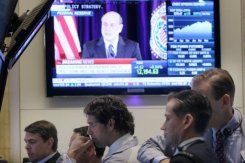 |
| The central bank’s decisions were widely expected by economists and experts © AFP/Getty Images Spencer Platt |
AFP
WASHINGTON (AFP) – The Federal Reserve left monetary policy in neutral Wednesday as it slashed US economic growth estimates, saying the slowdown was in part due to factors that were “likely” to be temporary.
The Federal Open Market Committee (FOMC) unanimously decided to hold its near-zero interest rate, end a $600-billion bond-buying program by June 30 and continue to reinvest its principal payments from security holdings.
The central bank’s decisions were widely expected by economists and experts.
“The Fed is trapped between the proverbial rock and a hard place,” said RDQ Economics analysts John Ryding and Conrad DeQuadros.
“The economy is weaker than it would like to see and this prevents any reference to exiting from the current policy stance of near-zero rates and a massive Fed balance sheet.”
The policy-setting FOMC, in a statement after a two-day meeting, said “the economic recovery is continuing at a moderate pace, though somewhat more slowly than the committee expected.”
The slowdown “in part” was due to “factors that are likely to be temporary,” such as higher food and energy prices which were crimping consumer purchasing power and supply chain disruptions related to Japan’s March earthquake and tsunami disaster, the committee said.
Separately the Fed released quarterly economic projections that slashed about a half point off its estimate of gross domestic product growth for 2011, to a range between 2.7 percent and 2.9 percent, and lowered the 2012 estimate, as well.
Fed chairman Ben Bernanke said the key reasons for keeping monetary policy loose were “the ongoing labor market slack” and “the subdued inflation outlook.”
The Fed has additional “untested” tools available to ease monetary policy further if conditions worsen, including increasing securities purchases or giving a fixed date for the next rate hike, but “none of them are without risks or costs,” Bernanke said at a post-FOMC news conference.
The central bank held its target federal funds rate between zero and 0.25 percent, where it has been since December 2008 in an effort to stimulate growth after a financial sector meltdown.
For the 22nd consecutive meeting, Fed policymakers said it would likely remain exceptionally low “for an extended period.”
The Fed expressed concern about rising unemployment, which hit a rate of 9.1 percent in May. “We expect the unemployment rate to continue to decline, but the pace of progress remains frustratingly slow,” Bernanke said.
The Fed’s latest economic projections indicated little relief was on the way in the jobs market, hiking estimates for 2011 and 2012.
This year’s unemployment rate was now estimated between 8.6 percent and 8.9 percent, up 0.2 point from the April estimate.
But the central bank, which has a legal mandate to foster maximum employment and price stability, maintained a benign view on a recent pickup in inflation, insisting longer-term inflation expectations had remained stable.
Bernanke, however, stressed the difficulty of making accurate forecasts and acknowledged the economy is facing more long-lasting challenges to recovery.
“Maybe some of the headwinds that have been concerning us, like… weakness in the financial sector, problems in the housing sector, balance sheets and deleveraging issues, some of these headwinds may be stronger or more persistent than we thought,” he said.
Bernanke also warned of potential risks to the global economy from Greece’s sovereign debt crisis.
“If there were a failure to resolve that situation, it would pose threats to the European financial systems, the global financial system and to European political unity,” he said.
The Fed said it would complete its plan to end its $600 billion second round of bond buying, or quantitative easing, dubbed QE2, on June 30.
The central bank also maintained its policy of reinvesting principal payments from its securities holdings to keep cash pouring into the economy.
The Fed has spent more than $2 trillion on mortgage securities and other assets to boost economic growth since the crisis began.
© AFP — Published at Activist Post with license
linkwithin_text=’Related Articles:’


Be the first to comment on "Fed freezes policy despite slow US economy"